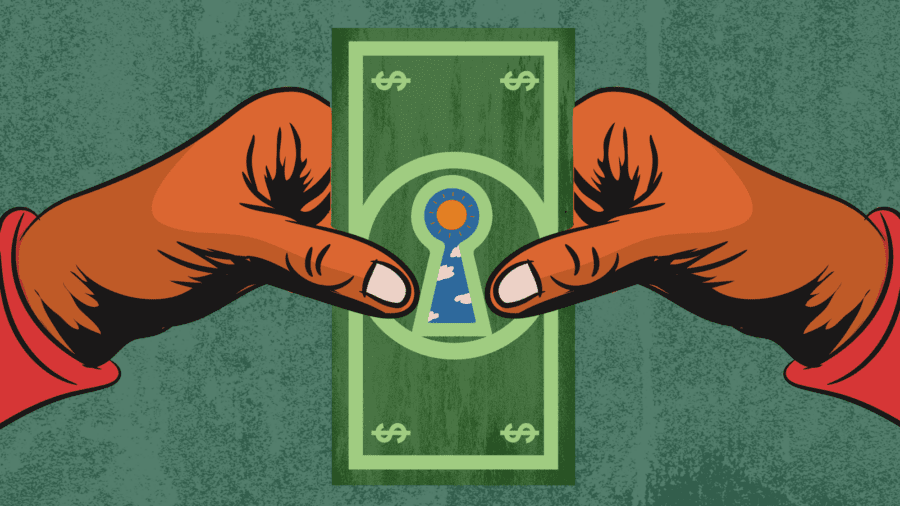
A Beginner’s Guide to Having Uncomfortable Conversations with Your Partner About Money
One of the biggest sources of interpersonal conflict is money, and when it comes to you and your partner, it can make or break your relationship — if you let it.
So just as delaying discussion about finances can come back to haunt you in the future, broaching the sensitive, touchy topic with a mindful approach can help you create a financial life that works for you both and even brings you closer together.
This may seem easier said than done, and you wouldn’t be alone in feeling hesitant to talk about an issue we’re rarely taught to talk about well. There are all sorts of reasons we put it off, no matter what stage we’re at in the relationship.
Maybe you just met someone you think is absolutely gorgeous, smart, interesting, and possibly your future spouse. Do you really want to bring up money and make things awkward or find out something you’re not prepared to know? Or maybe you’re just shell-shocked from the last time money was an issue with a partner, and bringing up the topic again feels a little scary.
Avoiding the topic tends to make things worse, however, and the longer you put things off, the tougher it is to get started. So, take some time to learn a little about how to tackle this subject with your partner.
In this article, you’ll learn about money and relationships, when to talk about money with your partner, and how to talk about it confidently and effectively.
Which Money Worries Affect Relationships
Before we go into the how of the subject, let’s take a look at the types of issues that tend to come up in romantic partnerships. If you live with or marry your partner, you may be splitting expenses like groceries and bills, making shared purchases such as a house, raising kids, or preparing to retire together.
Different issues will affect couples at different points along their dating timeline. For those new to a relationship or to talking about money with their spouse, use these points to get a sense of what you’ll want to find out about your partner (and what you should expect to share with them).
For those who are a little more experienced, use these points to see what you might be forgetting about — or even to validate the fact that every couple faces similar issues.
Spending Habits
- Are they a spender or a saver?
- What do they think is worth spending money on?
- What do they like to save on?
- Do they use a budget?
Financial Literacy
- What do they know about investments?
- What do they know about retirement?
- Do they know about mindset hacks and tools to manifest money?
Debt
- What’s their credit score?
- Do they have bills in collections?
- How much debt do they have?
- What’s their plan for paying off debt?
Planning for the Future
- What are their plans for retirement?
- When do they want to retire?
- What do they want for their children?
Equality and Decision-Making
- Do they think both partners should have equal say, even if one makes more?
- What is their view on financial decision-making?
- Do they think partners should be 50-50 financially?

The Greatness Mindset
Learn the secrets of some of the greatest minds in the world. Unlock the power of your mind and live your best life today.
Learn MoreHow to Talk Money with Your Partner
Start Early
Talking to your partner about money isn’t always comfortable, but breaking the ice early can cut down on anticipatory anxiety. The key to successful communication about finances is regularity. To build trust over time and make money talks a habitual thing, start early on.
Of course, this doesn’t mean you quiz your potential significant other about their credit score on date three. If you’re just getting to know someone, you just want to get a sense of their values and experiences. You can do this naturally through regular conversation about their work, what they do in their free time, and what some of their life goals are.
As you get closer, however, you want to get more specific. If you’re considering moving in together, you might want to know how their credit is, what they save and spend on (some people love to splurge on organic food from Whole Foods, others are completely fine with ramen), and how they view shared bills and finances.
By the time marriage is on the table, you’ll want to discuss retirement, what type of lifestyle you both want, and issues around shared finances, such as whether or not you want separate accounts, which expenses are shared, and whether those expenses are based on earnings.
Start Off Light
If you haven’t talked much with your partner about money or you’re still just getting to know them, it’s good to take baby steps and keep things light and playful at first.
A great way to do this is with “what if” questions. Ask them: What if you had the choice between an amazing experience, like a trip to a jungle in South America, or paying off one of your credit cards? Which would you choose and why?
What if you won the lottery? Would you invest the money, or would you splurge? If you could choose between working long hours but making a killer salary or having a four day work week and just getting by, which would you choose?
These are fun questions that help you understand and talk about your values, whether saving is important, what you want to spend your money on, and what kind of lifestyle you desire to have.
Another great option is to try setting a simple money goal together, such as saving for a weekend trip. You can use this experience to get to know your partner better or, if you know them well, build better communication around practical nuts and bolts of shared financial goals.
Choose the Right Time and Place
Once you’ve gotten used to money conversations or are closer with your partner, you can tackle the touchier topics of handling disagreements, discussing credit scores, or budgeting.
Since money can be a big source of conflict, the more you do to manage the emotions of the conversation, the better. That’s why it’s so important to choose the right time and place for the conversation and give your partner plenty of notice too. Springing a money discussion on your partner at the end of a long work day makes it easier for you both to get triggered, uncomfortable, and upset.
If you’re the one bringing up the discussion, suggest or wait for a time when you know you’ll both be well-rested and well-nourished. Avoid talking late at night, right after work, while drinking alcohol, or when you’re both already emotionally charged.
Try to let your partner know ahead of time. You can even treat it like a business meeting, scheduling it with a calendar invitation for a time during the day. Have goals, prepare your documents, and schedule it in with a time limit. If you can, plan for something fun to do together later.
Set Goals and Stick to Them
It’s all too easy to get side-tracked during an emotional conversation and veer off your intended course. This can be overwhelming as we take in more information than we were prepared for, and in a worst-case scenario, it can lead to an argument.
You can avoid this by agreeing on one goal to accomplish together, such as simply sharing each other’s credit scores, going over your grocery budget and spending, or talking about shared goals, like opening a joint account. Break up big, seemingly overwhelming goals into smaller ones that you keep up with on a regular basis.
Join In 200 Million+ On The Journey to Greatness
Bring an Article to Discuss with Them
We’ll admit that this one is a little bit of a cheat, but it really makes the process of bringing up money easier!
Send your partner an article — much like this one — about managing money as a couple, why communication about money is important, or a specific topic related to money and couples. Let them know the article caught their eye and that you think the advice in the articles is a great idea. It’s important to be positive and show your curiosity about how the two of you might navigate that topic.
This can also help your partner take it less personally if they are prone to being defensive. Simply let them know you found the piece intriguing and you want to strengthen your relationship by opening your communication further.
Focus on the Positive During Conflict Situations
Last but not least, an attitude of cooperation and a focus on the positive in your relationship will make these conversations go more smoothly. Focus on your commonalities — you both care about each other, you both want the relationship to work, and so on. Keep those top of mind, and remind yourself and your partner of them when things start getting a little sticky.
You don’t have to agree on everything, and it’s not always easy to see eye to eye, but you can highlight and refer back to the fact that you’re on the same team. An approach like this will go much further than one in which you’re preparing to go into battle.
Learning to Navigate Uncomfortable Money Conversations Is Worth It
Talking about money with your partner isn’t as fun as date night, but it can strengthen your relationship and make you happier and healthier. You’ll avoid pitfalls, get an early start on discussing future goals, and can get to know your partner on a deeper level.
Not only is getting good at money talks worth it for your relationship, it positively impacts your well-being. When you avoid uncomfortable conversations, you know somewhere deep down that there’s an unresolved issue. That can lead you to worry and impact your mental, emotional, and even physical well-being. While having a money discussion is a little stressful at the moment, waiting for the conflict to arrive is going to take a bigger toll on you in the long run.
Plus, once you get the hang of it, these conversations can become second nature. There are plenty of other people having these conversations, and you can too!
Greatness Authors
Greatness Authors is a collection of writers, thinkers, curiosity experts, and students of the world who are committed to bringing you the most up-to-date, impactful, and inspiring information surrounding Greatness topics.

Before You Retire, Ask Yourself These 7 Financial Questions to Make Sure You’re in the Clear

The *New* Way to Market Your Business on YouTube & Best Practices for Higher Engagement

The Power of Masterminds to Grow Your Business and How to Find One Near You

4 Inspirational Stories That Prove Money Isn’t the Key to Happiness

A Beginner’s Guide to Building a Great Credit Score While Avoiding Debt and Common Credit Mistakes










